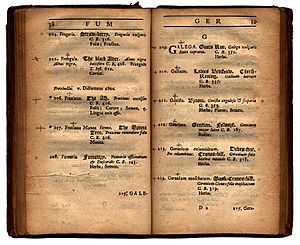Isaac Rand facts for kids
Isaac Rand (1674–1743) was an English botanist and an apothecary. An apothecary was like a pharmacist who also prepared medicines. Rand was an important lecturer and director at the famous Chelsea Physic Garden in London.
Contents
His Life Story
Isaac Rand was likely the son of James Rand. In 1674, his father helped build a wall around the Chelsea Botanical Garden. By 1700, Isaac Rand was already working as an apothecary in London. He had his own practice in a busy area called Haymarket.
Isaac Rand passed away in 1743. However, some records suggest he might have died a few years earlier, around 1738 or 1740. After his death, another apothecary named Joseph Miller took over his important role at the garden.
His Work with Plants
Isaac Rand was very good at finding and studying plants. He was especially interested in the smaller, less noticeable plants growing around London.
Discovering New Plants
In 1700, a botanist named Leonard Plukenet wrote about Rand. He called Rand a "very careful plant investigator." Rand discovered a plant now known as Rumex palustris in Westminster. This is a type of dock plant.
He also showed other botanists where to find plants. For example, he showed Samuel Doody a beautiful dock plant called Rumex maritimus growing near Burlington House. Another botanist, Adam Buddle, noted that Rand found Mentha pubescens (a type of mint) near ponds in Marylebone. Rand also found a plant that was named "Rand's Oak Blite" (Chenopodium glaucum).
Leading the Chelsea Physic Garden
In 1707, Rand and other members of the Society of Apothecaries took over the lease of the Chelsea Garden. This was to help the Society manage it. Rand became a trustee, helping to guide the garden's work.
Around 1718, he became a demonstrator of plants for the Society. This meant he taught people about the plants. In 1724, he was given a new, very important job. He became the præfectus horti, which means the director of the garden.
As director, Rand had many duties. He had to give at least two plant demonstrations every month during the summer. He also had to send fifty plant samples each year to the Royal Society. This was part of the agreement when Sir Hans Sloane donated the garden.
During Rand's time as director, Philip Miller was the head gardener. In 1736, the famous Swedish botanist Carl Linnæus even visited the garden. Rand also helped artists. He provided plant specimens to Elizabeth Blackwell for her book, Curious Herbal. This book had many beautiful plant illustrations.
Rand encouraged other artists, like Georg Dionysius Ehret, to draw the living plants from the garden. He was also friends with Mark Catesby, who collected seeds from the Americas. Rand even subscribed to Catesby's important book about the natural history of that region.
Plant Catalogues
Isaac Rand created two important lists of the plants in the Chelsea Garden. He also worked with the Leiden Physic Garden in the Netherlands. In 1730, Rand printed his first catalogue called Index plantarum officinalium in horto Chelseiano. This was a list of medicinal plants in the Chelsea Garden. He wrote that the Apothecaries' Company asked him to print it.
In 1739, Rand published another book, Horti medici Chelseiani Index Compendiarius. This was a longer, alphabetical list of plants in Latin. It was 214 pages long.
His Legacy
After Rand died, his wife gave his botanical books and a large collection of dried plants to the Apothecaries' Company. She also left money to help replace old plant specimens each year. This collection of dried plants, called a herbarium, was kept at Chelsea until 1863. Then, it was given to the British Museum.
Rand was also a member of the Royal Society starting in 1739. To honor him, Carl Linnæus kept the name Randia for a group of tropical plants. This name was first given by William Houston. Another plant genus, Singaporandia, found in Singapore, also honors him.
 | Precious Adams |
 | Lauren Anderson |
 | Janet Collins |


